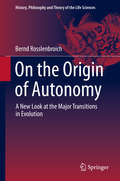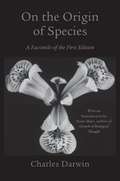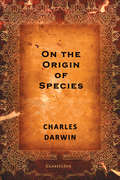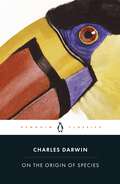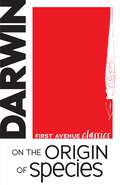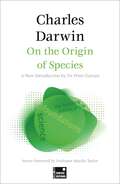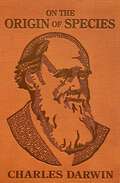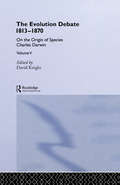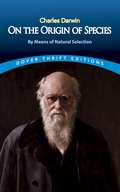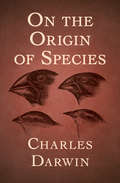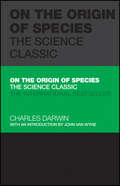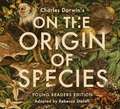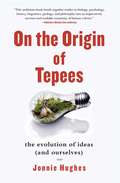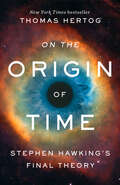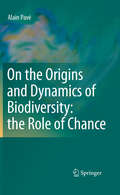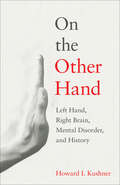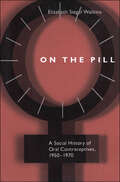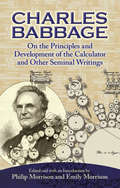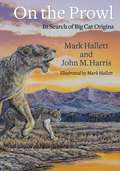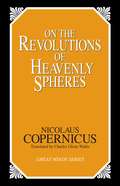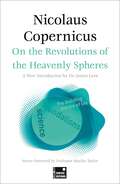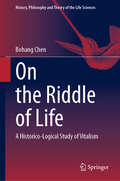- Table View
- List View
On the Origin of Autonomy
by Bernd RosslenbroichThis volume describes features of autonomy and integrates them into the recent discussion of factors in evolution. In recent years ideas about major transitions in evolution are undergoing a revolutionary change. They include questions about the origin of evolutionary innovation, their genetic and epigenetic background, the role of the phenotype and of changes in ontogenetic pathways. In the present book, it is argued that it is likewise necessary to question the properties of these innovations and what was qualitatively generated during the macroevolutionary transitions. The author states that a recurring central aspect of macroevolutionary innovations is an increase in individual organismal autonomy whereby it is emancipated from the environment with changes in its capacity for flexibility, self-regulation and self-control of behavior. The first chapters define the concept of autonomy and examine its history and its epistemological context. Later chapters demonstrate how changes in autonomy took place during the major evolutionary transitions and investigate the generation of organs and physiological systems. They synthesize material from various disciplines including zoology, comparative physiology, morphology, molecular biology, neurobiology and ethology. It is argued that the concept is also relevant for understanding the relation of the biological evolution of man to his cultural abilities. Finally the relation of autonomy to adaptation, niche construction, phenotypic plasticity and other factors and patterns in evolution is discussed. The text has a clear perspective from the context of systems biology, arguing that the generation of biological autonomy must be interpreted within an integrative systems approach.
On the Origin of Species
by Charles DarwinIn On the Origin of Species, naturalist Charles Darwin examines the role of natural selection in the evolution of plant and animal species. Revolutionary at the time of its publication in 1859, On the Origin of Species and Darwin's theory of natural selection served as one of the foundations or modern theories of evolution.Be it mystery, romance, drama, comedy, politics, or history, great literature stands the test of time. ClassicJoe proudly brings literary classics to today's digital readers, connecting those who love to read with authors whose work continues to get people talking. Look for other fiction and non-fiction classics from ClassicJoe.
On the Origin of Species
by Charles DarwinThis exciting anniversary edition has a new introduction and scholarly references by William Bynum, and the cover design is by Damien Hirst. It replaces our existing 1968 edition. The Origin of Species is one of the most important and influential books of its time and remains one of the most significant contributions to philosophical and scientific thought. The theories Darwin sets out here had an immediate and profound impact on the literature and philosophical thought of his contemporaries, and continue to provoke thought and debate today. Written for the general public of the 1850's, The Origin of Species laid out an evolutionary view of the world which challenged contemporary beliefs about divine providence and the fixity of species. He also set forth the results of his pioneering work on the interdependence of species: the ecology of animals and plants.
On the Origin of Species (First Avenue Classics ™)
by Charles DarwinIn 1831 British naturalist Charles Darwin joined a five-year expedition on the ship HMS Beagle. As the crew explored the southern hemisphere, Darwin took extensive notes on the organisms he encountered and how they differed from the species back home in England. He began to formulate ideas about the effect of natural selection on the evolution of species over time. The evidence he gathered, especially finch specimens collected from South America and the Galápagos Islands, provided further proof for his theory. In 1859, more than twenty years later, Darwin published his research—and sparked a heated debate. Misunderstood by theologians and misappropriated by eugenicists, it would be years before Darwin's controversial theory gained widespread acceptance in the scientific community. This is an unabridged version of Charles Darwin's fundamental text on evolutionary biology.
On the Origin of Species (Foundations)
by Charles DarwinDarwin's masterpiece helped shaped the cultural landscape of the world today. Now in a digestible, pocket format for the modern reader.Initially received with muted applause, Darwin's The Origin of Species by Means of Natural Selection was soon recognized as the breakthrough scientific advance that explained the evidence of the world around us, the place and history of humans, the connections between environment and evolution. Still regarded by some as radical, Darwin's contribution to world knowledge is immeasurable. This new, popular edition has been edited and abridged for the modern reader, to introduce Darwin's research in a digestible form.The FLAME TREE Foundations series features core publications which together have shaped the cultural landscape of the modern world, with cutting-edge research distilled into pocket guides designed to be both accessible and informative.
On the Origin of Species (Word Cloud Classics)
by Charles DarwinThe sixth and final edition of Charles Darwin&’s groundbreaking work that introduced the theory of evolution by means of natural selection.First published in 1859, Charles Darwin&’s On the Origin of Species introduced the scientific theory of evolution by means of natural selection, a revolutionary idea at the time. Fiercely debated on its release, Darwin&’s famous work was revised several times over the following decade, partly to refute the scientific and religious objections of the author&’s contemporaries. In this sixth edition of On the Origin of Species, Darwin lays out his theory by citing his studies done in the Galápagos aboard the HMS Beagle in the 1830s, as well as his follow-up research over the ensuing two decades.
On the Origin of Species, 1859 (The\evolution Debate, 1813-1870 Ser.)
by Charles DarwinOn the Origin of Species caused an uproar when it was first published in 1859. Darwin's theory was that species had evolved from simpler organisms by natural selection acting upon the variability of populations. This view was directly opposed to the doctrine of special creation by God and angered the Church and Victorian public opinion. This volume is a facsimile of one of the original copies sent to the eminent geologist Leonard Horner. The volume also includes sample pages from Darwin's original handwritten manuscript; the exclusive property of the Natural History Museum.
On the Origin of Species: By Means of Natural Selection (Dover Thrift Editions)
by Charles Darwin"The Origin is one of the most important books ever published, and a knowledge of it should be a part of the intellectual equipment of every educated person. . . . The book will endure in future ages so long as a knowledge of science persists among mankind." -- NatureIt took Charles Darwin more than twenty years to publish this book, in part because he realized that it would ignite a firestorm of controversy. On the Origin of Species first appeared in 1859, and it remains a continuing source of conflict to this day. Even among those who reject its ideas, however, the work's impact is undeniable. In science, philosophy, and theology, this is a book that changed the world.In addition to its status as the focus of a dramatic turning point in scientific thought, On the Origin of Species stands as a remarkably readable study. Carefully reasoned and well-documented in its arguments, the work offers coherent views of natural selection, adaptation, the struggle for existence, survival of the fittest, and other concepts that form the foundation of modern evolutionary theory. This volume is a reprint of the critically acclaimed first edition.
On the Origin of Species: First Edition
by Charles DarwinDarwin&’s most famous work formed the bedrock of evolutionary biology In one of the most important contributions to scientific knowledge, Charles Darwin puts forth the theory that species evolve over time through the process of natural selection. When he first established this hypothesis, many ideas about evolution had already been proposed and were receiving public acclaim, but none could fully explain the course of human evolution as elegantly as Darwin&’s did. Drawn from extensive research performed on various creatures living in the Galápagos Islands, his research suggests that &“one species does change into another.&” This revolutionary notion has become a landmark of scientific theory. This ebook has been professionally proofread to ensure accuracy and readability on all devices.
On the Origin of Species: The Science Classic (Capstone Classics)
by Charles DarwinA new, deluxe hardcover edition of one of the most important scientific works ever written In December 1831, Charles Darwin boarded the HMS Beagle, accompanying her crew on a five-year journey that crossed the Atlantic Ocean to survey the coasts of South America. As the expedition’s geologist and naturalist, Darwin collected evidence from the Galapagos Islands and other locations which prompted him to speculate that species evolve over generations through a process of natural selection. In 1859, Darwin published On the Origin of Species, a work of scientific literature considered to be the foundation of evolutionary biology. His revolutionary work presented evidence from the Beagle expedition as well as from years of subsequent research and experimentation. Written for non-specialists, Darwin’s book gained widespread interest from the scientific community, religious leaders, politicians and the general public. The theory Darwin presented in his book quickly became the subject of heated debate and discussion. Now accepted by the scientific community, Darwin’s concepts of evolutionary adaptation via natural selection are central to modern evolutionary theory and form the foundation of modern life sciences. Perhaps the most transformative scientific volume ever published, this volume of the first edition of On the Origin of Species: Outlines Darwin’s ideas, scientific influences and the core of his theory Details natural selection and address possible objections to the theory Examines the fossil record and biogeography to support evolutionary adaptation Features a "Recapitulation and Conclusion" which reviews key concepts and considers the future relevance of Darwin’s theory On the Origin of Species: The Science Classic is an important addition to the bestselling Capstone Classics series edited by Tom Butler-Bowdon. It includes an insightful Introduction from leading Darwin scholar Dr John van Wyhe of the University of Singapore, which presents new research and an offers an original perspective on Darwin and his famous work. This high-quality, hardcover volume is a must-have for readers interested in science and scientific literature, particularly evolutionary theory and life sciences.
On the Origin of Species: Young Readers Edition
by Charles Darwin Rebecca StefoffCharles Darwin’s groundbreaking On the Origin of Species is now available in an accessible, illustrated edition for young readers that includes an introduction, glossary, modern insight and information, and more!Charles Darwin’s famous theory of natural selection shook the world of science to its core, challenging centuries of orthodox beliefs about life itself. Darwin’s boundary-shattering treatise was captured in On the Origin of Species, originally published in 1859, a groundbreaking and detailed study on ecological interrelatedness, the complexity of animal and plant life, and the realities of evolution. This Young Reader’s Edition makes Darwin’s cornerstone of modern science accessible to readers of all ages. Meticulously curated to honor Darwin’s original text, this compelling edition also provides contemporary insight, photographs, illustrations, and more. This adaptation is a must-have for any reader with a curious mind and the desire to explore one of the most influential books of our time.
On the Origin of Tepees
by Jonnie HughesWhy do some ideas spread, while others die off? Does human culture have its very own "survival of the fittest"? And if so, does that explain why our species is so different from the rest of life on Earth? Throughout history, we humans have prided ourselves on our capacity to have ideas, but perhaps this pride is misplaced. Perhaps ideas have us. After all, ideas do appear to have a life of their own. And it is they, not us, that benefit most when they are spread. Many biologists have already come to the opinion that our genes are selfish entities, tricking us into helping them to reproduce. Is it the same with our ideas? Jonnie Hughes, a science writer and documentary filmmaker, investigates the evolution of ideas in order to find out. Adopting the role of a cultural Charles Darwin, Hughes heads off, with his brother in tow, across the Midwest to observe firsthand the natural history of ideas--the patterns of their variation, inheritance, and selection in the cultural landscape. In place of Darwin's oceanic islands, Hughes visits the "mind islands" of Native American tribes. Instead of finches, Hughes searches for signs of natural selection among the tepees. With a knack for finding the humor in the quirks of the American cultural landscape, Hughes takes us on a tour from the Mall of America in Minneapolis to what he calls the "maul" of America--Custer's last stand--stopping at road-sides and discoursing on sandwiches, the shape of cowboy hats, the evolution of barn roofs, the 28.99 wording of jokes, the wearing of moustaches, and, of course, the telling features from tepees of different tribes. Original, witty, and engaging, On the Origin of Tepees offers a fresh way of understanding both our ideas and ourselves.
On the Origin of Tepees: The Evolution of Ideas (and Ourselves)
by Jonnie HughesWhy do some ideas spread, while others die off? Does human culture have its very own "survival of the fittest"? And if so, does that explain why our species is so different from the rest of life on Earth? Throughout history, we humans have prided ourselves on our capacity to have ideas, but perhaps this pride is misplaced. Perhaps ideas have us. After all, ideas do appear to have a life of their own. And it is they, not us, that benefit most when they are spread. Many biologists have already come to the opinion that our genes are selfish entities, tricking us into helping them to reproduce. Is it the same with our ideas? Jonnie Hughes, a science writer and documentary filmmaker, investigates the evolution of ideas in order to find out. Adopting the role of a cultural Charles Darwin, Hughes heads off, with his brother in tow, across the Midwest to observe firsthand the natural history of ideas--the patterns of their variation, inheritance, and selection in the cultural landscape. In place of Darwin's oceanic islands, Hughes visits the "mind islands" of Native American tribes. Instead of finches, Hughes searches for signs of natural selection among the tepees. With a knack for finding the humor in the quirks of the American cultural landscape, Hughes takes us on a tour from the Mall of America in Minneapolis to what he calls the "maul" of America--Custer's last stand--stopping at road-sides and discoursing on sandwiches, the shape of cowboy hats, the evolution of barn roofs, the 28.99 wording of jokes, the wearing of moustaches, and, of course, the telling features from tepees of different tribes. Original, witty, and engaging, On the Origin of Tepees offers a fresh way of understanding both our ideas and ourselves.
On the Origin of Time: Stephen Hawking's Final Theory
by Thomas HertogStephen Hawking&’s closest collaborator offers the intellectual superstar&’s final thoughts on the cosmos—a dramatic revision of the theory he put forward in A Brief History of Time.&“This superbly written book offers insight into an extraordinary individual, the creative process, and the scope and limits of our current understanding of the cosmos.&”—Lord Martin ReesPerhaps the biggest question Stephen Hawking tried to answer in his extraordinary life was how the universe could have created conditions so perfectly hospitable to life. In order to solve this mystery, Hawking studied the big bang origin of the universe, but his early work ran into a crisis when the math predicted many big bangs producing a multiverse—countless different universes, most of which would be far too bizarre to harbor life. Holed up in the theoretical physics department at Cambridge, Stephen Hawking and his friend and collaborator Thomas Hertog worked on this problem for twenty years, developing a new theory of the cosmos that could account for the emergence of life. Peering into the extreme quantum physics of cosmic holograms and venturing far back in time to our deepest roots, they were startled to find a deeper level of evolution in which the physical laws themselves transform and simplify until particles, forces, and even time itself fades away. This discovery led them to a revolutionary idea: The laws of physics are not set in stone but are born and co-evolve as the universe they govern takes shape. As Hawking&’s final days drew near, the two collaborators published their theory, which proposed a radical new Darwinian perspective on the origins of our universe. On the Origin of Time offers a striking new vision of the universe&’s birth that will profoundly transform the way we think about our place in the order of the cosmos and may ultimately prove to be Hawking&’s greatest legacy.
On the Origins and Dynamics of Biodiversity: the Role of Chance
by Alain PavéChance is necessary for living systems - from the cell to organisms, populations, communities and ecosystems. It is at the heart of their evolution and diversity. Long considered contingent on other factors, chance both produces random events in the environment, and is the product of endogenous mechanisms - molecular as well as cellular, demographic and ecological. This is how living things have been able to diversify themselves and survive on the planet. Chance is not something to which Life has been subjected; it is quite simply necessary for Life. The endogenous mechanisms that bring it about are at once the products and the engines of evolution, and they also produce biodiversity. These internal mechanisms - veritable "biological roulettes" - are analogous to the mechanical devices that bring about "physical chance". They can be modeled by analogous mathematical equations. This open the way of a global modeling of biodiversity dynamics, but we need also to gather quantitative data in both the laboratory setting as well as in the field. By examining biodiversity at all scales and all levels, this book seeks to evaluate the breadth of our knowledge on this topical subject, to propose an integrated look at living things, to assess the role of chance in its dynamics, in the evolutionary processes and also to imagine practical consequences on the management of living systems.
On the Other Hand: Left Hand, Right Brain, Mental Disorder, and History
by Howard I. KushnerDoes being left-handed make a person different in any way that matters?Since the late Stone Age, approximately 10 percent of humans have been left-handed, yet for most of human history left-handedness has been stigmatized. In On the Other Hand, Howard I. Kushner traces the impact of left-handedness on human cognition, behavior, culture, and health. A left-hander himself, Kushner has long been interested in the meanings associated with left-handedness, and ultimately with whether hand preference can even be defined in a significant way. As he explores the medical and cultural history of left-handedness, Kushner describes the associated taboos, rituals, and stigma from around the globe. The words "left" and "left hand" have negative connotations in all languages, and left-handers have even historically been viewed as disabled.In this comprehensive history of left-handedness, Kushner asks why left-handedness exists. He examines the relationship—if any—between handedness, linguistics, and learning disabilities, reveals how toleration of left-handedness serves as a barometer of wider cultural toleration and permissiveness, and wonders why the reported number of left-handers is significantly lower in Asia and Africa than in the West. Written in a lively style that mixes personal biography with scholarly research, On the Other Hand tells a comprehensive story about the science, traditions, and prejudices surrounding left-handedness.
On the Pill: A Social History of Oral Contraceptives, 1950-1970
by Elizabeth Siegel Watkins"In 1968, a popular writer ranked the pill's importance with the discovery of fire and the developments of tool-making, hunting, agriculture, urbanism, scientific medicine, and nuclear energy. Twenty-five years later, the leading British weekly, the Economist, listed the pill as one of the seven wonders of the modern world. The image of the oral contraceptive as revolutionary persists in popular culture, yet the nature of the changes it supposedly brought about has not been fully investigated. After more than thirty-five years on the market, the role of the pill is due for a thorough examination."—from the IntroductionIn this fresh look at the pill's cultural and medical history, Elizabeth Siegel Watkins re-examines the scientific and ideological forces that led to its development, the part women played in debates over its application, and the role of the media, medical profession, and pharmaceutical industry in deciding issues of its safety and meaning. Her study helps us not only to understand the contraceptive revolution as such but also to appreciate the misinterpretations that surround it.
On the Principles and Development of the Calculator and Other Seminal Writings
by Charles Babbage Philip Morrision Emily MorrisonRegarded as a crackpot by his contemporaries and a genius by modern scientists, Charles Babbage (1792–1871) was the true discoverer of the principles on which all modern computing machines are based. His achievements have been virtually forgotten, but this compilation of his writings, in addition to those of several of his contemporaries, illuminates his pioneering work.Part I consists of selections from Babbage's long-out-of-print autobiography, Passages from the Life of a Philosopher, in which he recounts the pursuit of his dreams and remarks on noteworthy acquaintances, including Laplace, Biot, Humboldt, and Sir Humphry Davy. Additional features include articles, sketches, and letters by Babbage himself along with notes by his contemporaries that explain the principles and operation of the inventor's brilliant — but never completed — calculating machines. An informative Introduction places these writings in their historical context.
On the Prowl: In Search of Big Cat Origins
by John Harris Mark HallettBig cats such as lions, tigers, leopards, and jaguars fascinate us like few other creatures. They are enduring symbols of natural majesty and power. Yet despite the magnetic appeal of the big cats, their origins and evolutionary history remain poorly understood—and human activity threatens to put an end to the big cats’ glory.On the Prowl is a fully illustrated and approachable guide to the evolution of the big cats and what it portends for their conservation today. Mark Hallett and John M. Harris trace the origins of these iconic carnivores, venturing down the evolutionary pathways that produced the diversity of big cat species that have walked the earth. They place the evolution and paleobiology of these species in the context of ancient ecosystems and climates, explaining what made big cats such efficient predators and analyzing their competition with other animals. Hallett and Harris pay close attention to human impact, from the evidence of cave paintings and analysis of ancient extinctions up to present-day crises. Their engaging and carefully documented account is brought to life through Hallett’s detailed, vivid illustrations, based on the most recent research by leading paleontologists. Offering a fresh look at the rise of these majestic animals, On the Prowl also makes a powerful case for renewed efforts to protect big cats and their habitats before it is too late.
On the Revolutions of Heavenly Spheres (Great Minds Ser.)
by Nicolaus CopernicusThe Ptolemaic system of the universe, with the earth at the center, had held sway since antiquity as authoritative in philosophy, science, and church teaching. Following his observations of the heavenly bodies, Nicolaus Copernicus (1473-1543) abandoned the geocentric system for a heliocentric model, with the sun at the center. His remarkable work, On the Revolutions of Heavenly Spheres, stands as one of the greatest intellectual revolutions of all time, and profoundly influenced, among others, Galileo and Sir Isaac Newton.
On the Revolutions of the Heavenly Spheres (Foundations)
by Copernicus Professor Marika TaylorControversial at the time, Copernicus's discoveries led to the scientific revolution, and a greater understanding of our place in the universe.An accessible, abridged edition with a new introduction. Renaissance Natural philosopher Nicolaus Copernicus's pioneering discovery of the heliocentric nature of the solar system is one of the few identifiable moments in history that define the understanding of the nature of all things. His great work was the consequence of long observation and resulted in the first stage of the Scientific Revolution by correctly positing that the earth and other planets of the solar system revolved around the sun. Not only did this promote further study to understand the place of humanity in the world and the universe, it questioned the authority of the organised Christian Church in the West to be the keeper of fundamental truths. Ultimately this would lead to the Enlightenment, and the separation of religion, government and science.The FLAME TREE Foundations series features core publications which together have shaped the cultural landscape of the modern world, with cutting-edge research distilled into pocket guides designed to be both accessible and informative.
On the Riddle of Life: A Historico-Logical Study of Vitalism (History, Philosophy and Theory of the Life Sciences #37)
by Bohang ChenThis book presents a historico-logical study of vitalism. It begins by uncovering previously unknown doctrines of vitalism from the history of science—encompassing biological, physical, and social sciences—and then subjects these doctrines to a thorough logical analysis. Through this process, the book offers a unified conceptual framework to understand the major doctrines of vitalism in the history of science, ultimately relating vitalism to the question of life. Following the classical methodological approach endorsed by Immanuel Kant, nineteenth-century philosopher-scientists like Ernst Mach, and early-twentieth-century logical analysts, including logical empiricists, British analysts, pragmatists, Husserlian phenomenologists, and neo-Kantians, this work provides unconventional and valuable perspectives on vitalism and the riddle of life, appealing to a broad audience, including scientists, historians, and philosophers of science, particularly those from biological backgrounds.
On the Scale, a Weighty Tale: A Weighty Tale (Math Is Categorical Ser.)
by Brian P. Cleary Brian GableNIMAC-sourced textbook
